并列句专项讲解&练习(含答案)
图片预览
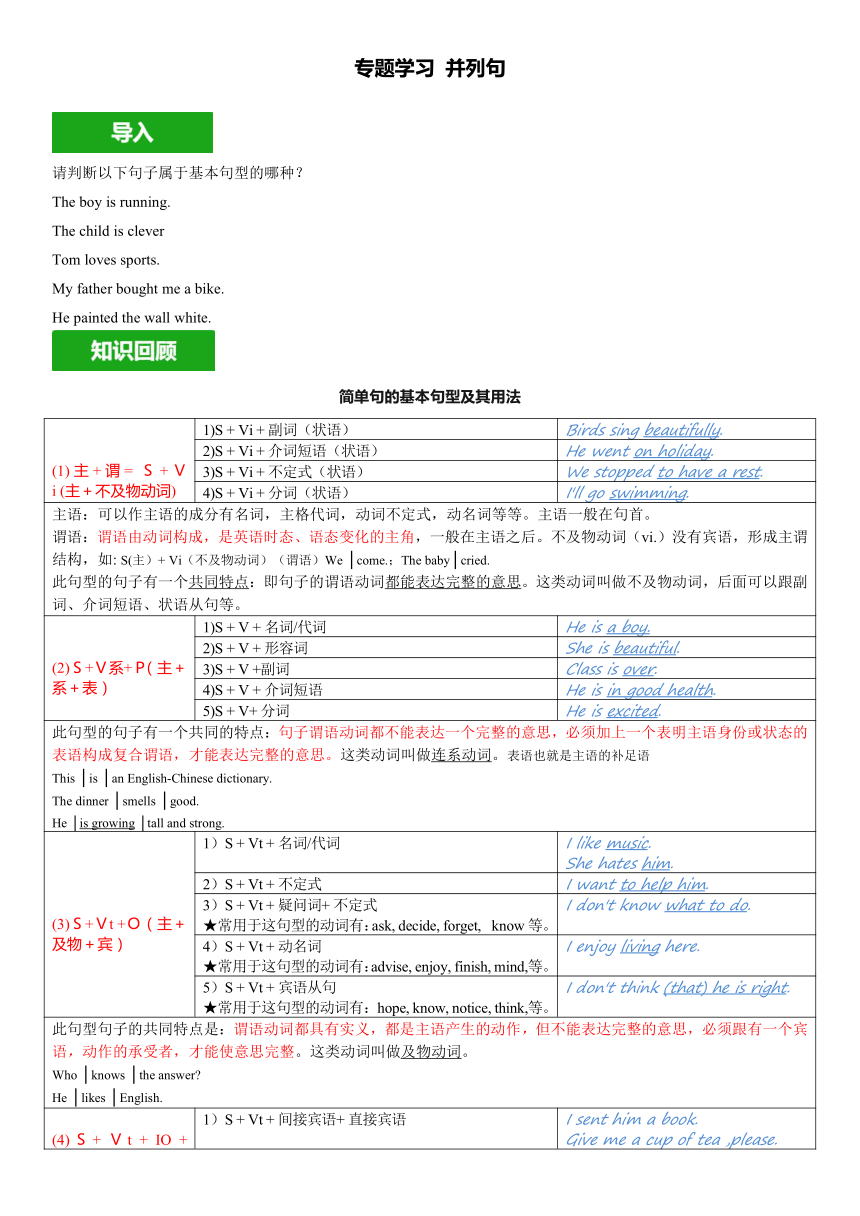
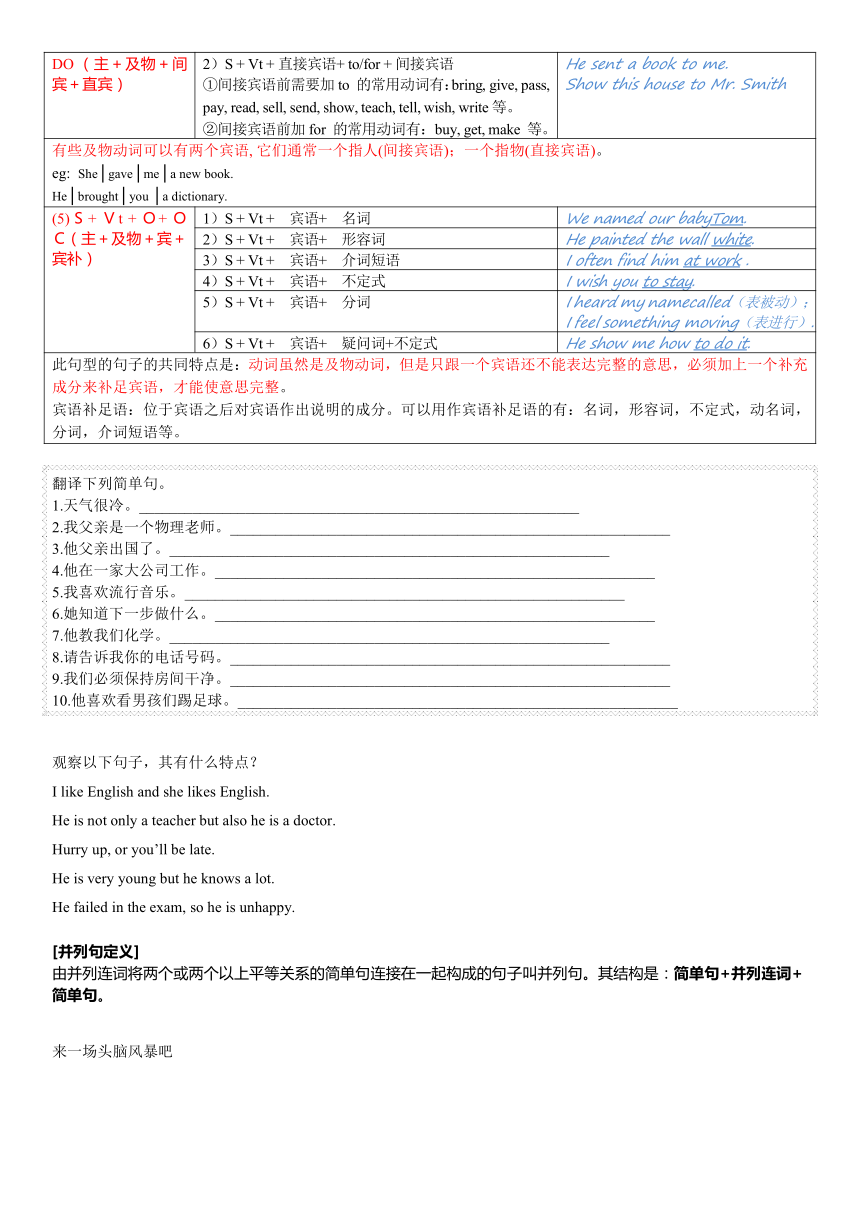
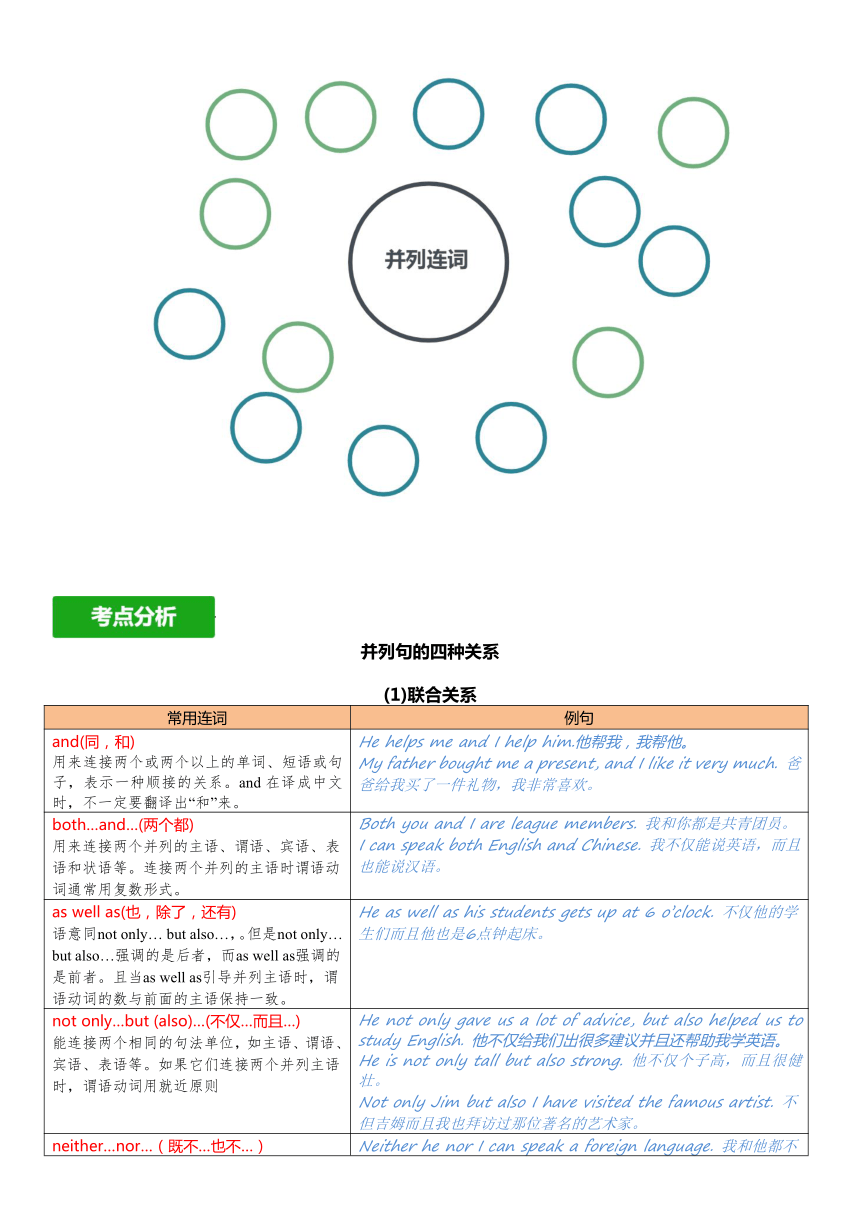
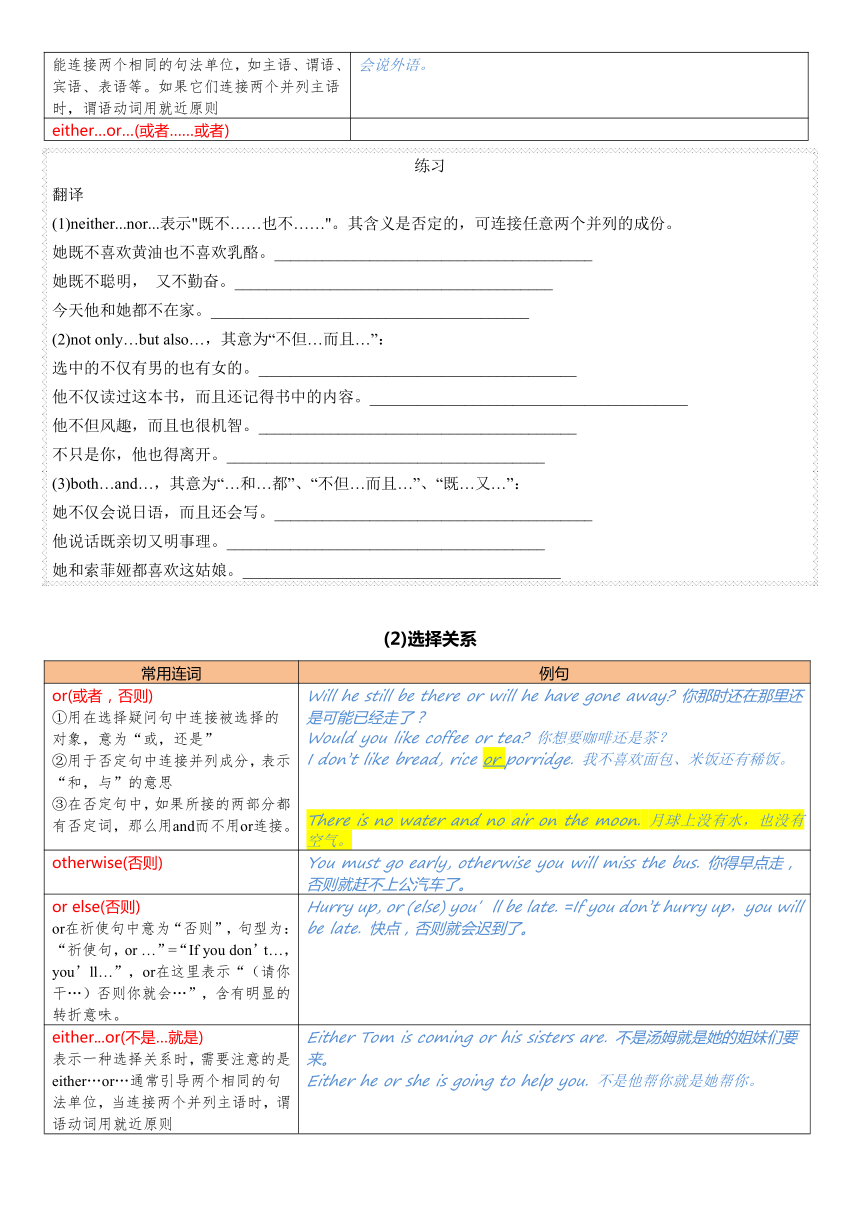
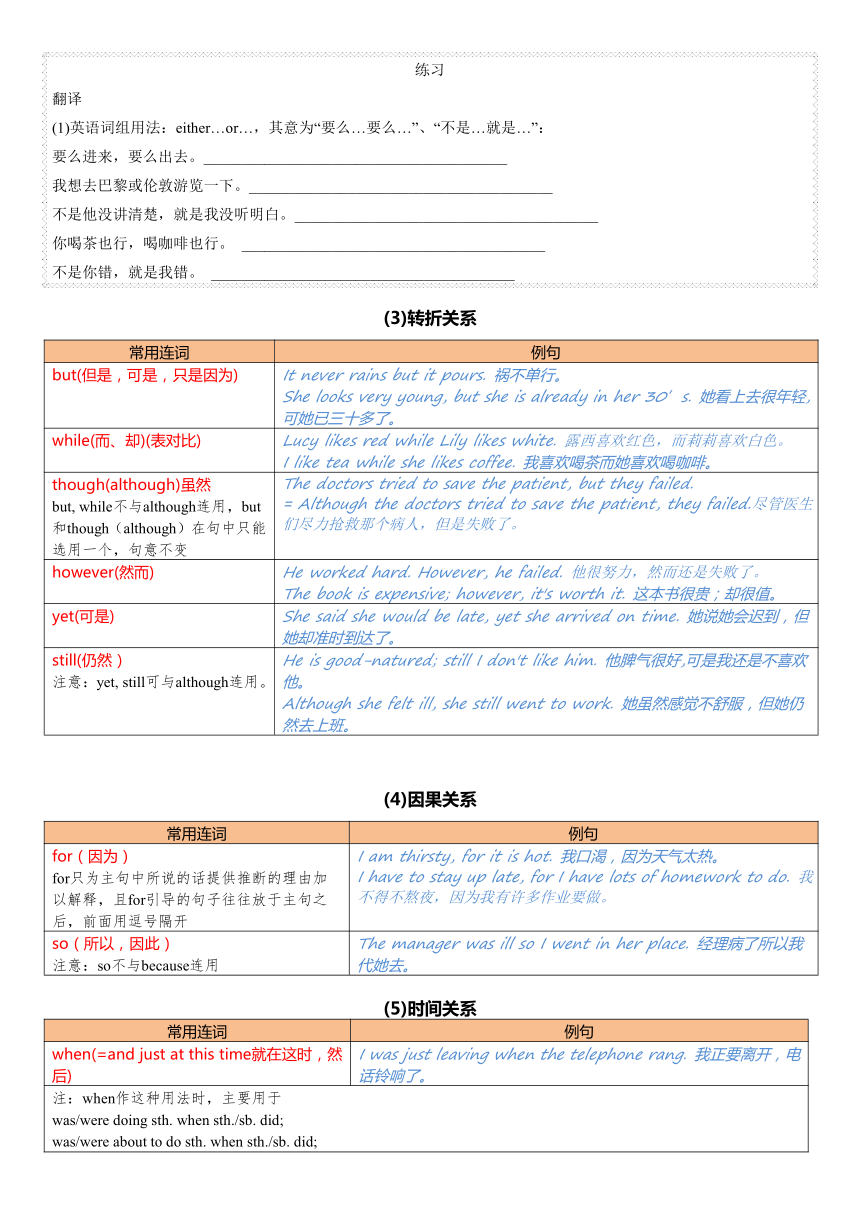
文档简介
专题学习 并列句
请判断以下句子属于基本句型的哪种?
The boy is running.
The child is clever
Tom loves sports.
My father bought me a bike.
He painted the wall white.
简单句的基本句型及其用法
(1)主+谓=?S+Vi?(主+不及物动词) 1)S + Vi +?副词(状语) Birds sing?beautifully.
2)S + Vi +?介词短语(状语) He went?on holiday.
3)S + Vi +?不定式(状语) We stopped?to have a rest.
4)S + Vi +?分词(状语) I'll go?swimming.
主语:可以作主语的成分有名词,主格代词,动词不定式,动名词等等。主语一般在句首。谓语:谓语由动词构成,是英语时态、语态变化的主角,一般在主语之后。不及物动词(vi.)没有宾语,形成主谓结构,如: S(主)+ Vi(不及物动词)(谓语)We?│come.;The baby│cried.此句型的句子有一个共同特点:即句子的谓语动词都能表达完整的意思。这类动词叫做不及物动词,后面可以跟副词、介词短语、状语从句等。
(2)S+V系+P(主+系+表) 1)S + V +?名词/代词 He is?a boy.
2)S + V +?形容词 She is?beautiful.
3)S + V +副词 Class is over.
4)S + V +?介词短语 He is in good health.
5)S + V+?分词 He is?excited.
此句型的句子有一个共同的特点:句子谓语动词都不能表达一个完整的意思,必须加上一个表明主语身份或状态的表语构成复合谓语,才能表达完整的意思。这类动词叫做连系动词。表语也就是主语的补足语 This?│is?│an English-Chinese dictionary. The dinner?│smells?│good.???????????? He │is growing?│tall and strong.??
(3)S+Vt +O(主+及物+宾) 1)S + Vt +?名词/代词?? I like?music. ? She hates?him.
2)S + Vt +?不定式?? I want?to help him.
3)S + Vt +?疑问词+?不定式??★常用于这句型的动词有:ask, decide, forget,? know等。 I don't know?what to do.
4)S + Vt +?动名词??★常用于这句型的动词有:advise, enjoy, finish, mind,等。 I enjoy living?here.
5)S + Vt +?宾语从句 ★常用于这句型的动词有:hope, know, notice, think,等。 I don't think?(that) he is right.
此句型句子的共同特点是:谓语动词都具有实义,都是主语产生的动作,但不能表达完整的意思,必须跟有一个宾语,动作的承受者,才能使意思完整。这类动词叫做及物动词。 Who?│knows?│the answer? He?│likes?│English.
(4)S+?Vt + IO + DO?(主+及物+间宾+直宾) 1)S + Vt +?间接宾语+?直接宾语 I sent him a book.? Give me a cup of tea ,please.
2)S + Vt +?直接宾语+ to/for +?间接宾语①间接宾语前需要加to 的常用动词有:bring, give, pass, pay, read, sell, send, show, teach, tell, wish, write等。②间接宾语前加for 的常用动词有:buy, get, make 等。 He sent a book to me.? Show this house to Mr. Smith
有些及物动词可以有两个宾语,?它们通常一个指人(间接宾语);一个指物(直接宾语)。eg:??She│gave│me│a new book. He│brought│you?│a dictionary.
(5)S+?Vt +?O+?OC(主+及物+宾+宾补) 1)S + Vt +?宾语+?名词 We named our babyTom.
2)S + Vt +?宾语+?形容词 He painted the wall?white.
3)S + Vt +?宾语+?介词短语 I often find him?at work?.
4)S + Vt +?宾语+?不定式? I wish you?to stay.
5)S + Vt +?宾语+?分词 I heard my namecalled(表被动); I feel something?moving(表进行).
6)S + Vt +?宾语+?疑问词+不定式? He show me how?to do it.
此句型的句子的共同特点是:动词虽然是及物动词,但是只跟一个宾语还不能表达完整的意思,必须加上一个补充成分来补足宾语,才能使意思完整。宾语补足语:位于宾语之后对宾语作出说明的成分。可以用作宾语补足语的有:名词,形容词,不定式,动名词,分词,介词短语等。
翻译下列简单句。
1.天气很冷。__________________________________________________________
2.我父亲是一个物理老师。__________________________________________________________
3.他父亲出国了。__________________________________________________________
4.他在一家大公司工作。__________________________________________________________
5.我喜欢流行音乐。__________________________________________________________
6.她知道下一步做什么。__________________________________________________________
7.他教我们化学。__________________________________________________________
8.请告诉我你的电话号码。__________________________________________________________
9.我们必须保持房间干净。__________________________________________________________
10.他喜欢看男孩们踢足球。__________________________________________________________
观察以下句子,其有什么特点?
I like English and she likes English.
He is not only a teacher but also he is a doctor.
Hurry up, or you’ll be late.
He is very young but he knows a lot.
He failed in the exam, so he is unhappy.
[并列句定义]
由并列连词将两个或两个以上平等关系的简单句连接在一起构成的句子叫并列句。其结构是:简单句+并列连词+简单句。
来一场头脑风暴吧
并列句的四种关系
(1)联合关系
常用连词 例句
and(同,和)用来连接两个或两个以上的单词、短语或句子,表示一种顺接的关系。and在译成中文时,不一定要翻译出“和”来。 He helps me and I help him.他帮我,我帮他。My father bought me a present, and I like it very much. 爸爸给我买了一件礼物,我非常喜欢。
both…and…(两个都)用来连接两个并列的主语、谓语、宾语、表语和状语等。连接两个并列的主语时谓语动词通常用复数形式。 Both you and I are league members. 我和你都是共青团员。I can speak both English and Chinese. 我不仅能说英语,而且也能说汉语。
as well as(也,除了,还有)语意同not only… but also…,。但是not only… but also…强调的是后者,而as well as强调的是前者。且当as well as引导并列主语时,谓语动词的数与前面的主语保持一致。 He as well as his students gets up at 6 o’clock. 不仅他的学生们而且他也是6点钟起床。
not only…but (also)…(不仅…而且…)能连接两个相同的句法单位,如主语、谓语、宾语、表语等。如果它们连接两个并列主语时,谓语动词用就近原则 He not only gave us a lot of advice, but also helped us to study English. 他不仅给我们出很多建议并且还帮助我学英语。He is not only tall but also strong. 他不仅个子高,而且很健壮。 Not only Jim but also I have visited the famous artist. 不但吉姆而且我也拜访过那位著名的艺术家。
neither…nor…(既不…也不…)能连接两个相同的句法单位,如主语、谓语、宾语、表语等。如果它们连接两个并列主语时,谓语动词用就近原则 Neither he nor I can speak a foreign language. 我和他都不会说外语。
either…or…(或者……或者)
练习
翻译
(1)neither...nor...表示"既不……也不……"。其含义是否定的,可连接任意两个并列的成份。21cnjy.com
她既不喜欢黄油 (?http:?/??/?www.21cnjy.com" \t "_blank" \o "欢迎登陆21世纪教育网?)也不喜欢乳酪。________________________________________
她既不聪明, 又不勤奋。________________________________________
今天他和她都不在家。________________________________________
(2)not only…but also…,其意为“不但…而且…”:
选中的不仅有男的也有女的。________________________________________
他不仅读过这本书,而且还记得书中的内容。________________________________________
他不但风趣,而且也很机智。________________________________________
不只是你,他也得离开。________________________________________
(3)both…and…,其意为“…和…都”、“不但…而且…”、“既…又…”:
她不仅会说日语,而且还会写。________________________________________
他说话既亲切又明事理。________________________________________
她和索菲娅都喜欢这姑娘。________________________________________
(2)选择关系
常用连词 例句
or(或者,否则)①用在选择疑问句中连接被选择的对象,意为“或,还是”②用于否定句中连接并列成分,表示“和,与”的意思③在否定句中,如果所接的两部分都有否定词,那么用and而不用or连接。 Will he still be there or will he have gone away? 你那时还在那里还是可能已经走了?Would you like coffee or tea? 你想要咖啡还是茶?I don’t like bread, rice or porridge. 我不喜欢面包、米饭还有稀饭。 There is no water and no air on the moon. 月球上没有水,也没有空气。
otherwise(否则) You must go early, otherwise you will miss the bus. 你得早点走,否则就赶不上公汽车了。
or else(否则)or在祈使句中意为“否则”,句型为:“祈使句,or …”=“If you don’t…,you’ll…”,or在这里表示“(请你干…)否则你就会…”,含有明显的转折意味。 Hurry up, or (else) you’ll be late. =If you don’t hurry up,you will be late. 快点,否则就会迟到了。
either...or(不是…就是)表示一种选择关系时,需要注意的是either…or…通常引导两个相同的句法单位,当连接两个并列主语时,谓语动词用就近原则 Either Tom is coming or his sisters are. 不是汤姆就是她的姐妹们要来。Either he or she is going to help you. 不是他帮你就是她帮你。
练习
翻译
(1)英语词组用法:either…or…,其意为“要么…要么…”、“不是…就是…”: 21
要么进来,要么出去。________________________________________
我想去巴黎或伦敦游览一下。________________________________________
不是他没讲清楚,就是我没听明白。________________________________________
你喝茶也行,喝咖啡也行。 ________________________________________
不是你错,就是我错。 ________________________________________
(3)转折关系
常用连词 例句
but(但是,可是,只是因为) It never rains but it pours. 祸不单行。 She looks very young, but she is already in her 30’s. 她看上去很年轻,可她已三十多了。
while(而、却)(表对比) Lucy likes red while Lily likes white. 露西喜欢红色,而莉莉喜欢白色。I like tea while she likes coffee. 我喜欢喝茶而她喜欢喝咖啡。
though(although)虽然but, while不与although连用,but和though(although)在句中只能选用一个,句意不变 The doctors tried to save the patient, but they failed. = Although the doctors tried to save the patient, they failed.尽管医生们尽力抢救那个病人,但是失败了。
however(然而) He worked hard. However, he failed. 他很努力,然而还是失败了。The book is expensive; however, it's worth it. 这本书很贵;却很值。
yet(可是) She said she would be late, yet she arrived on time. 她说她会迟到,但她却准时到达了。
still(仍然)注意:yet, still可与although连用。 He is good-natured; still I don't like him. 他脾气很好,可是我还是不喜欢他。 Although she felt ill, she still went to work. 她虽然感觉不舒服,但她仍然去上班。
(4)因果关系
常用连词 例句
for(因为)for只为主句中所说的话提供推断的理由加以解释,且for引导的句子往往放于主句之后,前面用逗号隔开 I am thirsty, for it is hot. 我口渴,因为天气太热。I have to stay up late, for I have lots of homework to do. 我不得不熬夜,因为我有许多作业要做。
so(所以,因此)注意:so不与because连用 The manager was ill so I went in her place. 经理病了所以我代她去。
(5)时间关系
常用连词 例句
when(=and just at this time就在这时,然后) I was just leaving when the telephone rang. 我正要离开,电话铃响了。
注:when作这种用法时,主要用于 was/were doing sth. when sth./sb. did; was/were about to do sth. when sth./sb. did; was/were on the point of doing sth. when sth./sb. did等句型中 表示“当某人或某物正在或正要做某事,就在这时突然又发生了另一事”。
并列句专项练习
一、选择填空
1. ________ did she go to see her father, ________ did she want her father to come.
A. Either, or B. Not, only C. No sooner, than D. Neither, nor
2. She didn’t go to school yesterday, _____ he had hurt her legs while climbing the mountain.
A. but B. however C. or D. for
3. You can study ________ Chinese ________ English.
A. not only, but B. either, or C. both, or D. only, and
4. Tom works very hard, ________ his family is still very poor.
A. yet B. for C. so D. and
5. ________ you ________ your parents go with us.
A. Either, or B. Both, or C. Either, nor D. Not, but
6. Some are reading newspapers, ________ others are playing basketball.
A. or B. for C. so D. while
7. We want ________ high speed ________ good marks.
A. both, said B. Either, or C. neither, nor D. not, also but
8. In spring it is ________ hot ________ cold here.
A. both, and B. either, or C. neither, nor D. not only, but
9. Maybe he has gone home, ________ he is in his office.
A. or B. but C. nor D. yet
10. You can ________ stay at home ________ go out to play.
A. either, or B. both, and C. so, that D. as, as
11. I help him ________ he helps me. We help each other.
A. but B. and C. or D. for
12. Don’t play football here, ________ you may break the windows.
A. or B. but C. and D. so
13. Jim was very hungry ________ he ate all the cakes.
A. and B. but C. so D. or
14. Hurry up, ________ we’ll be late for the concert.
A. and B. but C. so D. or
15. The nurse is very tired ________ she is still working very hard.
A. but B. and C. or D. if
16. Li Lei passed his father this cup ________ asked for some more tea.
A. but B. and C. of D. if
17. Are you going to play basketball ________ football this afternoon?
A. and B. or C. but D. so
18. He speaks not only English ________ also French.
A. and B. but C. or D. that
19. He likes sports ________ Jim enjoys reading.
A. When B. while C. then D. or
20. Go straight along the street, turn to the left at the end of the street and ________ you’ll find the post office.
A. then B. so C. but D. yet
21. She came here, ________ she didn’t see me.
A. so B. but C. and D. or
22. Jim likes getting up early, ________ his sister doesn’t.
A. and B. or C. so D. but
23. He got up late this morning, ________ he was late for school.
A. so B. but C. while D. yet
24. Are you free ________ busy this evening?
A. and B. but C. or D. then
25. They are not apples, ________ pears.
A. and B. yet C. but D. so
26. Jim is good at maths. ________ is Kate.
A. So B. And C. But D. Then
27. He didn’t do his homework, ________ his teacher was very angry.
A. but B. yet C. or D. so
28. Get up early, ________ you’ll be late for school.
A. but B. so C. or D. and
29. Hurry up, ________ you’ll catch the early bus.
A. but B. and C. so D. or
30. We may take Grandma Li to hospital, ________ we are busy.
A. and B. but C. so D. or
31. I went there by plane, ________ he went there by car.
A. and B. but C. so D. or
32. He made faces in class ________ we laughed.
A. and B. but C. so D. or
33. I was ill, ________ I stayed at home.
A. and B. so C. but D. or
34. He was late, ________ was she.
A. and B. so C. but D. or
35. She can’t swim, ________ can be.
A. nor B. or C. so D. but
36. ________ he ________ I know about this accident because it was kept as a secret.
A. Both, nor B. Neither, nor C. Both, and D. Neither, or
37. ________ Tuesday ________ Wednesday is OK. I’ll be free these days.
A. Both, and B. Either, or C. Both, and D. So, that
38. ________ John ________ Ann were ill yesterday.
A. Neither, nor B. Either, or C. Both, and D. So, that
39. The shop is new, ________ it has been open only for three days.
A. for B. and C. but D. so
40. His face turned red ________ he felt shy.
A. for B. but C. so D. and
41. He never drinks ________ smokes.
A. and B. but C. or D. so
42. Call a taxi, ________ you won’t be late to catch the underground train.
A. and B. or C. but D. so
43. Li Lei found a watch in the street, ________ he picked it up.
A. or B. but C. and D. so
44. You needn’t sweep the floor, ________ it’s very clean.
A. and B. but C. or D. for
45. Chinese dishes are delicious, ________ cooking takes a lot of time.
A. for B. so C. but D. and
46. Neither of them is in good health, ________ both work very hard.
A. and B. but C. then D. so
47. Tom works very hard, ________ he still failed in the exam.
A. yet B. so C. and D. or
48. The sky was clear, ________ the sun was shining.
A. but B. and C. or D. for
49. Hide behind the tree, ________ he will see and catch you.
A. and B. or C. but D. yet
50. I felt tired after the work, ________ I took a long rest.
A. so B. but C. for D. or
51. I hate smoking, ________ I don’t like drinking, either.
A. though B. but C. and D. for
52. Hurry up, ________ you’ll be late for the early bus.
A. and B. then C. but D. or
53. The man lives simply, for he ________ for a long time.
A. has been out of work B. has lost his works C. was out of his work D. was lost his job
54. Everyone is here, ________ Li Lei isn’t.
A. or B. but C. and D. yet
55. I am a student ________ my brother is a doctor.
A. or B. yet C. and D. so
56. He didn’t answer her, ________ he asked her a question.
A. that B. if C. or D. yet
57. Everyone in our class has finished their homework, ________ Lin Tao didn’t.
A. but B. or C. and D. so
58. Work harder, ________ you’ll catch up with the others.
A. and B. but C. or D. so
59. They bought her a present, ________ she liked it very much.
A. and B. but C. or D. so
60. This is our first lesson, ________ I don’t know all your names.
A. and B. but C. or D. so
61. I’m poor, ________ I always enjoy myself.
A. and B. but C. or D. so
62. I want to go shopping this afternoon. What about you? ________ do I.
A. So B. Neither C. Only D. But
63. ________ you ________ I are students.
A. Not only…but also B. Either…or C. Both…and D. Neither…nor
二、用 but, and, so, for, or 等并列连词填空
1. His letter is interesting ________ his hand writing is beautiful.
2. Put on your coat, ________you’ll get a cold.
3. Work hard at your lessons, ________ you will fail in the final exams.
4. Come early tomorrow, ________ I’ll show you the picture.
5. He did the work in times, ________ he did it quite well.
6. Everybody went there, ________ I didn’t.
7. We started early that day, ________ the place was so far.
8. I didn’t feel well last night, ________ I had to go to bed early.
9. He is very clever, ________ he doesn’t like studying hard.
10. Be quick, ________ we’ll miss the first lesson.
参考答案:
一、1. D 2. D 3. B 4. A 5. A 6. D 7. A 8. C 9. A 10. A 11. B 12. A 13. C 14. D 15. A 16. B 17.
B 18. B 19. B 20. A 21. B 22. D 23. A 24. C 25. C 26. A 27. D 28. C 29. B 30. B 31. A 32. A 33. B
34. B 35. A 36. B 37. C 38. C 39. A 40. D 41. C 42. B 43. C 44. D 45. C 46. B 47. A 48. B 49.
50. A 51. C 52. D 53. A 54. B 55. C 56. D 57 A 58. A 59. A 60. D 61. B 62. A 63.C
二、1. and 2. or 3. or 4. and 5. and 6. but 7. for 8. so 9. but 10. or
一、选择填空
1.I?help?him___?he?helps?me.?We?help?each?other.?
A.?but? B.?and? C.?or? D.?though?
2.___?he?___?I?am?a?doctor.
A.?Both;?and? B.?Either;?nor? C.?Neither;?nor? D.?Neither;?and?
3?Some?of?us?would?like?to?act?the?story?___?it?isn't?finished?yet.?
A.?but? B.?and? C.?though? D.?so
4?One?more?week,?___?we?will?finish?the?task.?
A.?or? B.?so?that ?C.?and? D.?if?
5?"The?ground?must?be?just?right?___?too?wet?___?too?dry.?
A.?either;?or? B.?both;?and? C.?between;?and? D.?neither;?nor
6?Sam?was?ill?yesterday,?so?he________his?homework.?
A.?didn't? B.?not?did? C.?didn't?do? D.?didn't?did?
7?Sorry,?there's?only?one?seat?left.?___?you___?she?can?have?it.?
A.?neither;?nor? B.?Either;?or? C.?Both;?and? D.?Not;?but?
8?He?_________coffee?at?all.?He?_________?tea.?
A.?doesn't?like,?prefers? B.?likes,?doesn't?prefer? C.?would?like,?not?prefers? D.?prefers,?is?not?food?of?
9?We?_________?happy?about?the?price?of?meat.
A.?don't? B.?are?not? C.?won't? D.?weren't?being
10?I?______?trouble?finding?the?place.?
A.?didn't?have?many? B.?haven't?a?great?deal?of? C.?didn't?have?much? D.?hadn't?a?lot?of?
11?_______?of?us?likes?the?film.?
A.?Both? B.?All? C.?Neither? D.?Some?
12?Which?sentence?is?right??
A.?I?don't?think?that?he?is?not?right.? B.?I?think?he?is?not?right.?
C.?I?don't?think?that?he?is?right.? D.?I?think?he?was?not?right.
13?They?are?___?young?___?carry?the?box?onto?the?table.?
A.?enough;?too? B.?too;?to? C.?so;?to ?D. very;?to?
14?They?________?lunch?at?home?every?day.?
A.?have?not? B.?didn't?have? C.?don't?have? D.?have?not?any?
15--________?is?your?English?teacher?like??--He?is?tall?and?thin.?
A.?How? B.?What? C.?Which? D.?/?
16?--_________do?you?like?the?new?play??--It's?good?and?interesting.?
A.?How? B.?Which? C.?What? D.?Whom? ? ?
17?Pay?attention?please,?___?of?you?want?to?attend?the?party??
A.?who ?B.?which? C.?whom? D.?what?
18?--___?did?you?sleep?last?night??--I?stayed?up?too?late?to?go?to?sleep.?
A.?How? B.?When? C.?Why ?D.?Where?
19?It?is?getting?dark.?Our?teacher_________.?
A.?lets?us?to?go?home? B.?lets?us?go?home? C.?let?us?go?to?home? D.?let?we?go?home?
20?_________?she?sings!?
A.?What?beautiful? B.?How?beautiful? C.?What?beautifully? D.?How?beautifully?
二、词语运用
阅读短文,用but;for;so;and填空,使短文通顺、意思完整。
Last week I went to the theatre___1___I had a very good seat. The play was very interesting ___2___ I did not enjoy it. A young man and a young woman were sitting behind me ___3___they were talking loudly. I got very angry, ___4___I could not hear the actors,___5___ I turned round and looked at the man and the woman angrily, ___6___ they did not pay attention. In the end, I could not bear it. I turned around again. "I can’t hear a word. I said angrily. "It’s none of your business, the young man said rudely. "This is a private conversation!
三、完形填空
Many people keeps small fish ___1___ pet. They keep them in a tank ___2___ a lot of water and small plants in it. The tank is made of glass so that people can see inside the tank __3__ watchthe fish. The fish need room. They mustn't be crowded. They need oxygen to breathe.
___4___ must be enough water for all fish. ___5___the size of the tank is very important. In the tank people put small plants which are good for?fish. They?give oxygen to?the?water.?Plants help?the?fish?in?other ways, too.?They?can?hide among?the plants,?sleep?___6___??lay?eggs?there.
The fish ___7___be kept in water all the time. So the tank should be covered ___8___ the fish will iump out. The fish need food and should be fed every day. ___9___ if you give them too much food, it is very bad, ___10___the extra food willl fall to the bottom and make the water dirty. So the fish should get just enough food and finish it in ten minutes.
Nothing should be left.
1.A.?for B. as C.?because D. because of
2.?A. with B?within C.?without D.?having
3.?A.but B?and C.?so D.?or
4.?A.Here B. There C. That D. This
5. A. So B.?yet C. but D. still
6. A.?and B.for C. when D.or (else)
7.A.may B. should C.?can ?D.?could
8.A?otherwise B.?or C.yet D.?A and B
9.A. But B.?Though C.?however D. although
10.?A. for B.so C.?enriched D?enriching
参考答案:
一、1—5?BCCCD?6---10?CBABC?11---15?CCBCB?16---20?ABCBD
二、1.and 2.but 3.and 4.for 5.so 6.but
三、1—5BABBA 6—10ABDAA
同课章节目录
- 词法
- 名词
- 动词和动词短语
- 动词语态
- 动词时态
- 助动词和情态动词
- 非谓语动词
- 冠词
- 代词
- 数词和量词
- 形容词副词及其比较等级
- 介词和介词短语
- 连词和感叹词
- 构词法
- 相似、相近词比较
- 句法
- 陈述句
- 一般疑问句和否定疑问句
- 特殊疑问句及选择疑问句
- 反意疑问句
- 存在句(There be句型)
- 宾语从句
- 定语从句
- 状语从句
- 主谓一致问题
- 简单句
- 并列句
- 复合句
- 主谓一致
- 主、表语从句
- 名词性从句
- 直接引语和间接引语
- 虚拟语气
- 感叹句
- 强调句
- 倒装句
- 祈使句
- 句子的成分
- 句子的分类
- 题型专区
- 单项选择部分
- 易错题
- 完形填空
- 阅读理解
- 词汇练习
- 听说训练
- 句型转换
- 补全对话
- 短文改错
- 翻译
- 书面表达
- 任务型阅读
- 语法填空
- 其他资料
